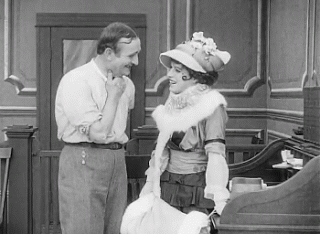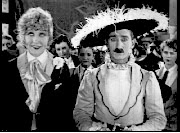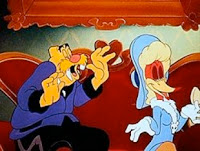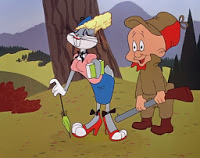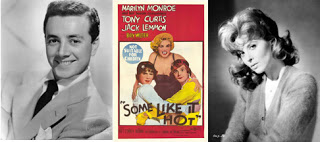Oddball Films Media
•
Aug 25, 2016
Image
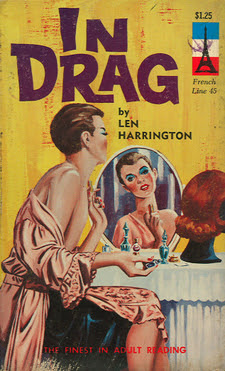
Date: Friday, August 26th, 2016 at 8:00pm
Admission: $10.00 - Limited Seating RSVP to RSVP@oddballfilms.com or (415) 558-8117
"You're born naked, the rest is Drag"
-Ru Paul Charles
Highlights Include:
The Masquerader AKA The Female Impersonator (B+W, 1914)
One of the earliest instances of drag in film. A Keystone Comedy written and directed by Charlie Chaplin and produced by Mack Sennett over a hundred years ago, also starring disgraced silent star Roscoe "Fatty" Arbuckle. A film director hires Chaplin in an acting role for his film. Chaplin ruins several takes and gets kicked off the set. He returns the next day in full drag and wins over the director with his beauty and coquettishness.
Print courtesy of the Jenni Olson Queer Film Archive.
Print courtesy of the Jenni Olson Queer Film Archive.
What's the World Coming To? (1926, B+W) Watch these gender-bending screwballs in this rare slapstick short by Hal Roach. In the future deliveries are made by blimp while men dress like women and women like men. Watch them marry in this gender bending screwball short!
Print courtesy of the Jenni Olson Queer Film Archive.
This amateur film produced by "Lorelei" is a faithful reenactment of the Brother's Grimm Cinderella.. except with a handful of lovely drag queens playing all the parts. A rare document of the San Francisco drag scene in the early 60s, this gem is like a long-lost step sister to Jack Smith's Flaming Creatures. Don't miss the amazingly cheezy production values, awesome wigs, and high-handed bitch slapping that blows Disney right out of the water. Poor Sinderella's hair gets a fabulous makeover when she's transformed! In B+W and color.
The infamously notorious and annoying Woody Woodpecker manages to get himself evicted from a boarding house run by proprietor Wally Walrus. Later lonely Wally runs an ad in the local newspaper looking for a sweetheart. Woody shows up in drag at Wally's place and eats him out of house and home! A laugh riot!
Image
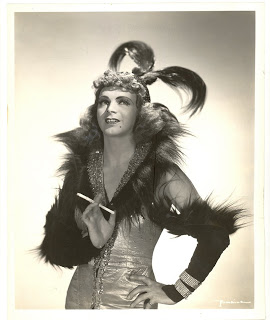
This burlesque-like comedy short reveals a lesbian encounter with another woman in the nightclub dressing room is less lesbian than it seems!
Black Cap Drag (Color, 1969)
It's London, 1969 and the world is in full groovy swing. At the New Black Cap in Camden, two performers steal the show, and reveal themselves and their stories to the viewer. Full of heart as well as humor, fun and fabulousness, Black Cap Drag is a remarkable and rare document of two men who can't wait to get dressed like Barbra Streisand and Marlene Dietrich. One of the first queer safe spaces in England - at a time when homosexuality was still illegal - the Black Cap recently closed its doors after five decades, as its building is sleighted for development, prompting protestors to rally for the iconic venue. A tribute to the dearly departed night club will be held in August at a BFI retrospective featuring a screening of this film, digitally transferred and provided by Oddball Films (we will be watching the original 16mm print)
Daffy Duck tries to match wits with Bugs Bunny as they debate whether it’s rabbit hunting season or duck hunting season. Elmer Fudd is totally witless in the exchange, especially when Bugs employs some tried-and-true cross-dressing to throw the hunter off his trail.
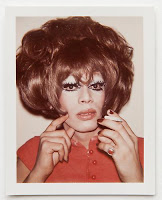
Image

Drag (B+W, 1970)
A poetic film by sexperimental maven Coni Beeson. In a small bedroom, a pair of legs puts on tights. Then we see the torso and the head of a man buttoning up a striped dress. A second man gets into a dress. The first man talks into the camera motioning around his face. The men help each other to put on high heels and lipstick. They dance together and one man wrestles the other onto the bed.
Plus! Tons of Vintage San Francisco Footage and a few more fabulous surprises!
For the Early Birds:
Some Like It Hot (b+w, 1961)
Super rare TV pilot (un-sold and un-aired) attempted to franchise the all time classic Billy Wilder film as a weekly program. Jack Lemmon and Tony Curtis appear at the opening before undergoing plastic surgery (the mob is still after them), re-emerging as “look-alikes” Vic Damone and Dick Patterson. For some reason, they continue to dress in drag and play with the all-girl band… Tina Louise (of Gilligan’s Isle fame) replaces Marylin Monroe and a bit part by George “I wish my brother George was here” Liberace.
Kat Shuchter is a graduate of UC Berkeley in Film Studies. She is a filmmaker, artist and esoteric film hoarder. She has helped program shows at the PFA, The Nuart and Cinefamily at the Silent Movie Theater and was crowned “Found Footage Queen” of Los Angeles, 2009. She has programmed over 250 shows at Oddball on everything from puberty primers to experimental animation.
About Oddball Films
Oddball Films is a stock footage company providing offbeat and unusual film footage for feature films like The Nice Guys and Milk, documentaries like The Black Panthers: Vanguard of the Revolution, Silicon Valley, Kurt Cobain: The Montage of Heck, television programs like Transparent and Mythbusters, clips for Boing Boing and web projects around the world.
Our screenings are almost exclusively drawn from our collection of over 50,000 16mm prints of animation, commercials, educational films, feature films, movie trailers, medical, industrial military, news out-takes and every genre in between. We’re actively working to present rarely screened genres of cinema as well as avant-garde and ethno-cultural documentaries, which expand the boundaries of cinema. Oddball Films is the largest film archive in Northern California and one of the most unusual private collections in the US. We invite you to join us in our weekly offerings of offbeat cinema.
Our screenings are almost exclusively drawn from our collection of over 50,000 16mm prints of animation, commercials, educational films, feature films, movie trailers, medical, industrial military, news out-takes and every genre in between. We’re actively working to present rarely screened genres of cinema as well as avant-garde and ethno-cultural documentaries, which expand the boundaries of cinema. Oddball Films is the largest film archive in Northern California and one of the most unusual private collections in the US. We invite you to join us in our weekly offerings of offbeat cinema.



